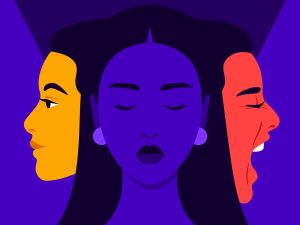Have you been feeling anxious lately? Have you felt paralysed over situations that seem out of your control? Have you wanted to calm down, but haven’t known how or what to do to help yourself? Anxiety can be an all-consuming experience that can leave us feeling powerless and out of control. However, it doesn’t have to be that way. At Sydney Hills Counselling, we have helped many clients recover from and overcome anxiety.
Anxiety is the combination of worrying thoughts, fearful emotions, and uncomfortable bodily sensations such as tense muscles, shallow breathing, and a racing heartbeat. Underlying anxiety is typically fear, but it can also include emotions such as anger, jealousy, or excitement.
A little anxiety can help to shift our nervous system switch to the ‘on’ position. This can give us a lift in energy that can help to prepare us for situations, make us alert, and take action if necessary. Essentially, this prepares our nervous system for our flight, flight, and freeze response.
There are many variants of anxiety; too many to include in this blog post, so I will focus on the most common ones my clients have presented with and their particular and often distressing symptoms.
Generalised Anxiety is one of the more common types of anxiety. This type of anxiety typically refers to when a person has excessive worry about many different matters. People who experience generalised anxiety often find that their minds seem to jump from one thing to another to worry about.
The symptoms of Generalised Anxiety can present as (but not limited to):
- Excessive worry that seems difficult to control
- Feeling tense, restless, or unable to relax
- Fatigue
- Seeking excessive reassurance from others to make sure they’re not angry or upset at you.
- Unable to focus on tasks.
- Feeling more irritable than usual
- Trouble sleeping
- Constantly thinking about the past; particularly bad experiences
- Worrying excessively about things that may happen in the future
These symptoms usually last for an extended period of time, usually 6 months or more, and can make it difficult to function at work, school, or other important areas of your life.
Social Anxiety is another type of anxiety that occurs when a person feels excessively worried when they find themselves in social situations. Feeling a little nervous when meeting people can be natural, however, social anxiety occurs when these feelings are disproportionate to a situation, or if they interfere with your ability to function in a social setting. Underlying social anxiety is usually a fear of being negatively perceived by others. this may lead to a person experiencing social anxiety to avoid social situations as a way to cope with the distress that interacting with others may cause.
Common Symptoms of Social Anxiety may include:
- Excessive fear of being in situations where you may scrutinised by others in a social setting, for example, meeting new people, conversing with others, being observed eating or drinking by others, or by giving a speech.
- Fear of acting in a manner where you believe you will be negatively judged by others.
- Being in any social situation causes you to feel fear
- You avoid social situations whenever possible
Similar to generalised anxiety, the symptoms usually occur for more than 6 months. They can also lead to an inability to be able to function in important areas of a person’s life. Social anxiety can be isolating and impact a person’s ability to form meaningful connections with others due to the great distress it causes.
Agoraphobia refers to a person’s fear of leaving their home, being in crowded places, or being somewhere where they feel they can’t escape. This may sometimes be experienced in combination with panic disorder; as an attempt to mitigate the possibility of having a panic attack in public or somewhere outside of their home.
Symptoms of Agoraphobia can present as:
- Being in a confined space such as a lift or enclosed elevator.
- Being in an enclosed space such as a movie theatre or crowded store.
- Experience high anxiety when taking public transport e.g., plane, train, tram, or bus.
- Standing in a queue or crowd
People who suffer from Agoraphobia often avoid the above situations, fearing that it will be too difficult for them to leave or escape the situation should they begin to experience panic symptoms. The anxiety that these situations create for an individual who has agoraphobia is almost always disproportionate to the true threat of the situation. For those who suffer from Agoraphobia, it may feel almost impossible for them to feel safe when trying to leave the house or do any of the above activities.
Health Anxiety may be concerning when you believe that you may have irrational and obsessive worries regarding having a serious and/or life-threatening medical condition. Health anxiety is a disorder where a person imagines they have the physical symptoms of an illness. Sometimes a person may wrongly interpret minor or normal physical sensations as symptoms of a serious or terminal disease. Even when reassured by medical professionals that they don’t have an illness, they may not believe them and mistrust their professional advice.
Common symptoms of Health Anxiety are:
- You are constantly worrying about your health.
- You act as though you are ill (e.g., you avoid exertion such as exercising).
- You constantly check your body for signs of illness, such as sources of pain, tingling, lumps, etc.
- You worry that the doctor or medical test missed something.
- You avoid anything to do with serious illness (e.g., not watching a television show that mentions disease, medical procedures, etc., or contrary to this, you watch medical programs to see whether your symptoms may match those the patients on the program presented with).
- You obsessively look online or in the media for health information.
Panic Attacks and Panic Disorder
People experience a panic attack when they experience a sudden and intense increase in their anxiety. It often feels to the person experiencing a panic attack that they are totally out of control and it can be absolutely terrifying for them. Panic attacks are often accompanied by physical symptoms such as:
- Increased heart rate
- Tingling or numbness
- Shaking
- Shortness of Breath
- Sweating
- Chest pain
- Nausea
- Dizziness
- Fear that they are dying.
These symptoms often cause huge distress and can last for quite some time. Although panic attacks can be scary, there are ways of treating and overcoming them.
3 Tips for Calming your Anxiety
- Question your Anxious Thoughts: Unhelpful (and often distorted) thoughts can embed themselves in your mind, misrepresenting the situation you may find yourself in. Challenging those unhelpful thoughts and fears and finding the ‘evidence’ to verify those thoughts, is one way you can regain control over anxiety.
- BREATHE: Box Breathing is one breathing technique that I teach my clients. It has physiological and psychological benefits. It helps to regulate the breath by increasing oxygen taken into the lungs and can help to reduce blood pressure and reduce heart rate. By focusing on your breath, box breathing can remove your attention to the things that are causing distressing feelings of anxiety. The repetition of box breathing can also help to reduce stress. Here is a 2-minute video you can follow to decrease your stress and experience calm.
- Exercise: Often, the best way to stop anxious thoughts is to leave the situation and get moving. Focusing on your body and not what’s going on in your mind may help to relieve your anxiety. Walking, yoga, and Tai Chi have been found to be effective in helping to reduce anxiety symptoms and decrease stress levels.
Anxiety in any form, can seem overwhelming to tackle on your own. This is why Sydney Hills Counselling is here to help you navigate the road to recover from, and overcome anxiety once and for all. We use a variety of techniques to support you in healing from your anxiety and tailor our approach to your specific needs. We recognise that no two individuals are alike in their experience of anxiety, so we utilise different modalities to improve your anxiety symptoms. Cognitive Behavioural Therapy, Acceptance and Commitment Therapy, Mind-Body approaches, Lifestyle Changes, and Mindfulness are just some of the modalities we use to treat anxiety.
If you’re ready to feel calm and in control again, let us help you begin your journey to overcome your anxiety. Call us today on (02) 9159 6277 to make an appointment or alternatively, email us at [email protected]. We always return phone calls and reply to emails within 48 hours.
Copyright © 2023 by Sydney Hills Counselling






